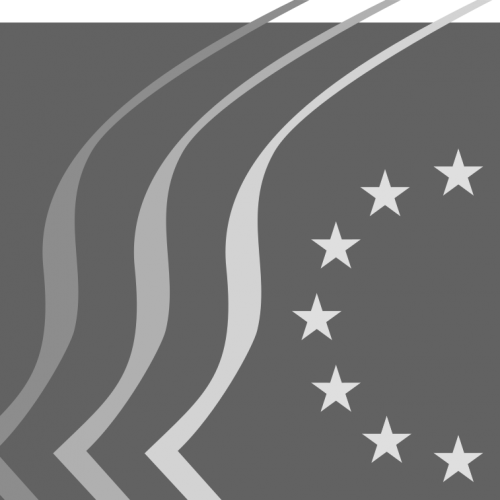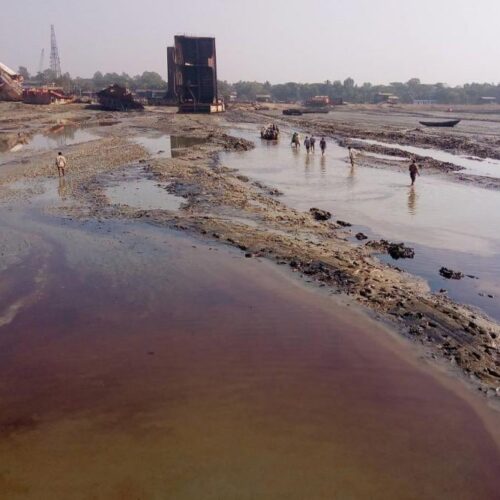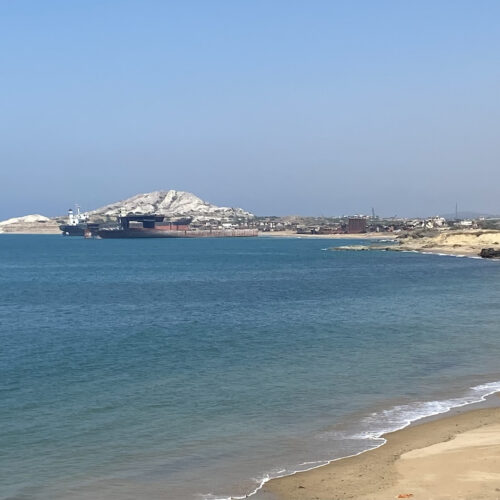Press Release – Prosecutor launches investigation after Icelandic journalists shed light on illegal export of toxic ships to India
Cash buyer GMS once again under the spotlight
Icelandic program Kveikur released yesterday an investigation on the murky sale of two ships owned by Icelandic company Eimskip. In a documentary broadcasted by radio and television Ríkisútvarpið (RÚV), Kveikur uncovers the illegal export of the container ships GODAFOSS and LAXFOSS to the Indian beach of Alang for dirty and dangerous scrapping. The Icelandic authorities have confirmed that the case has been brought to the public prosecutor for further investigation.
In an interview with RÚV, and in response to Kveikur’s documentary, Iceland’s Environment Minister Guðmundur Ingi Gudbrandsson said: “First, I am shocked over what I saw. You feel sad and, at the same time, angry that a company in the West would exploit vulnerable people that have no choice but to work under such horrible conditions. Workers are at constant risk of accidents and even losing their life, and environmental issues are given zero attention. The owners of these companies must respond to whether this is, in their view, morally acceptable, and if this is in line with the environmental and social responsibility policy that they set for themselves. That is the question that I, and I believe many others, were left with.”
At the end of 2019, Eimskip sold, as part of its fleet renewal, the GODAFOSS and LAXFOSS, while simultaneously agreeing with the buyer to charter the ships back until the company’s new-buildings were delivered. What may have seemed like a sale for further operational use was actually a scrap deal – Eimskip’s counterpart to the sale was none other than GMS, one of the most well-known cash buyers of end-of-life ships. GMS is behind nearly half of the total tonnage that has been beached in the Indian subcontinent so far in 2020. The company has also been linked by media and civil society to several toxic trade scandals, at least two of which are currently being criminally investigated by enforcement authorities in the UK. [1]
Eimskip denies any involvement in the decision to sell the ships for recycling and claims having been in the dark about their final destination.

The export of the two container vessels to South Asia was in clear breach of European waste laws, which prohibit the trade of hazardous waste, including end-of-life ships, from OECD countries to non-OECD countries. Both the GODAFOSS and LAXFOSS were in European waters when the decision to sell for scrap was taken. Before reaching the Indian beach of Alang, via Suez, they briefly stopped in Rotterdam and Athens respectively. At the time of the export of the ships, the NGO Shipbreaking Platform formally requested Icelandic, Dutch and Greek authorities to hold all the parties involved in the sale accountable for breaching EU waste legislation.
Researchers and journalists that have recently visited the Indian shipbreaking yards, often unannounced and undercover, have documented a reality that starkly contrasts with the industry efforts to greenwash beaching. The BBC exposed the case, which sees again the involvement of cash buyer GMS, of five oil and gas units owned by Diamond Offshore. Two of the units ended up being broken in Alang under dire conditions before the remaining three were arrested in Scotland, as it was suspected that the buyers sought to illegally export them to South Asia. Dutch programme ZEMBLA brought back similar accounts of horrifying practices in Alang, revealing how workers unknowingly were exposed to highly toxic mercury fumes when torching apart an FSO owned by offshore company SBM. In 2019 alone, at least fourteen vessels were sold to beaching yards in breach of the EU Waste Shipment Regulation. The Icelandic case adds itself to several ongoing criminal investigations.
NOTE
[1] See North Sea Producer case and Diamond Offshore case.
Related news

Press Release – European industry, trade unions and NGOs jointly support the EESC’s call for a financial incentive to enhance sustainable ship recycling
Today, the European Economic and Social Committee (EESC) adopted an own initiative opinion that calls on the European Commission to introduce an incentive that will “eliminate the… Read More

Platform News – NGO Shipbreaking Platform awarded grant by Royal Academy of Engineering and Lloyd’s Register Foundation
Engineering X has awarded nearly £1 million in grants to projects aimed at tackling challenges of decommissioning ships and offshore structures.
... Read More
Platform News – EU ship recyclers join voices to promote clean and safe practices
Five European ship recycling yards announced yesterday that they have joined forces to effectively raise awareness of existing best practice and the fact that there is capacity… Read More

Platform publishes South Asia Quarterly Update #13
There were a total of 210 ships broken in the second quarter of 2017. 158 of these ships ended up on South Asian beaches for dirty and… Read More

Bangladesh: shipping firms profit from labour abuse
A new report released by Human Rights Watch and the NGO Shipbreaking Platform uncovers the human and environmental costs of shipbreaking in Bangladesh.
... Read More
Platform publishes South Asia Quarterly Update #36
Eight workers suffered an accident on South Asian beaches in the last quarter of 2023.
... Read More

